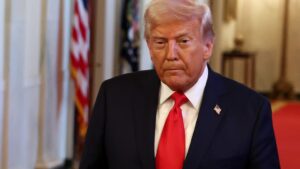Economic Sentiment Dips: Analyzing President Trump’s Approval Ratings
As the economic landscape continues to shift, recent survey data reveals that President Donald Trump is experiencing the worst economic approval ratings of his presidential tenure. According to a recent CNBC All-America Economic Survey, broad dissatisfaction stemming from his handling of tariffs, inflation, and government spending has contributed significantly to this decline.
The Decline of Economic Optimism
The initial sentiment of economic optimism that accompanied Trump’s re-election in 2020 has seemingly evaporated. Only 44% of Americans currently approve of Trump’s overall presidency, with a notable decline in confidence regarding the economy specifically—43% approval with 55% disapproval. This marks the first time in any CNBC poll that Trump has found himself in a net-negative position regarding economic management.
The implications of these numbers are profound. As reported by this survey, conducted from April 9 through 13, nearly half of Americans (49%) now believe the economy will worsen over the next year, representing a stark turnaround in sentiment. Micah Roberts, managing partner with Public Opinion Strategies, states, “We’re in a turbulent, kind of maelstrom of change when it comes to how people feel about what’s going to happen next.” This highlights that rising negative partisan reactions are critical in shaping current economic perceptions.
Discontent Across Party Lines
While Trump’s core Republican base remains supportive—59% still approve of his economic policies—there is a stark contrast when examining the sentiment of Democrats and independents. Democrats express a staggering -90 net economic approval, illustrating a significant jump in discontent compared to the previous presidential term. Independents have similarly turned negative, with a 23-point increase in disapproval.
Blue-collar voters, who were pivotal to Trump’s initial electoral success, show signs of diminishing confidence. Their approval ratings for Trump have declined by 14 points since his first term, indicating that even traditionally supportive demographics are beginning to question the efficacy of his economic strategies.
The Tariff Tangle
One of the most contentious issues is Trump’s approach to tariffs. The survey reveals that the public disapproves of across-the-board tariffs by a margin of 49% to 35%. Moreover, large majorities view nations like Canada, Mexico, the EU, and Japan as more of an economic opportunity rather than a threat, countering the strong protectionist sentiments expressed by Trump. Republicans’ support for tariffs, while still a majority, has dropped significantly from previous levels.
Inflation: The Achilles’ Heel
Arguably the most damaging aspect of Trump’s economic approval comes from his handling of inflation. The survey indicates that 60% of the public disapproves of his approach to inflation, which significantly impacts overall economic sentiment. An alarming 57% of Americans now believe we are either entering or already in a recession, a dramatic increase from just a few months prior.
A Market in Uncertainty
In the realm of investments, public sentiment has also soured. Over half of Americans (53%) believe that it’s currently a bad time to invest in the stock market, reflecting an unexpected and sharp reversal from previous optimism following Trump’s election. This growing pessimism emphasizes the often-volatile nature of investor psychology amid political and economic uncertainty.
Congressional Preferences: A Stalemate
Despite Trump’s declining approval, there appears to be no significant swing in congressional preferences. According to the same survey, support remains nearly tied between Democratic (48%) and Republican (46%) control, suggesting that while the President’s numbers may be faltering, the political landscape remains relatively stable.
Conclusion: A Landscape of Pessimism
As we analyze these recent findings, it’s clear that the road ahead for Trump’s economic approval is fraught with challenges. The twin issues of tariffs and inflation—coupled with rising recession fears—are creating a perfect storm of discontent among American voters. At Extreme Investor Network, we believe that understanding these dynamics is crucial for navigating the current economic landscape.
Stay informed about evolving trends and insights that shape our financial future. Subscribe to our newsletter for expert analysis and updates directly to your inbox. Explore the ongoing changes affecting markets, businesses, and your investments, ensuring you make informed decisions in this unpredictable economic environment.

